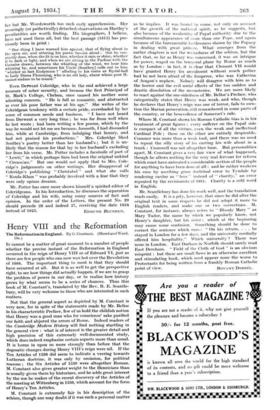Henry VIII and the Reformation
IT cannot be a matter of great moment to a number of people whether the precise instant of the Reformation in England occurred in the reign of Henry VIII or of Edward VI, just as there are few people who can now wax hot over the Revolution of 1688. The important thing to most is that they should have occurred at all. But it is as well to get the perspective right, to see how things did actually happen, if we are to grasp the problem of power in our day, or to realize how history grows by what seems to be a series of chances. Thus this book of M. Constant's, translated by the Rev. R. E. Scantle- bury, will be very welcome to those who are interested in such matters.
Not that the general aspect as depicted by M. Constant is very new, for in spite of the statements made by Mr. Belloc in his characteristic Preface, few of us hold the childish notion that Henry was a good man who for conscience' sake purified our faith and abjured the errors of Rome. Indeed readers of the Cambridge Modern History will find nothing startling in the general view : what is of interest is the greater detail and high precision of this extremely well-documented study, which does indeed emphasize certain aspects more than usual. It is borne in upon us more strongly than before that the dogmatic changes during Henry VIII's reign were nil. If the Ten Articles of 1586 did seem to indicate a veering towards Lutheran doctrine, it was only by omission, for political reasons ; the Six Articles of 1539 were altogether Roman. M. Constant also gives greater weight to the Henricians than is usually given them by historians, and he adds great interest by the use he makes of the recent discovery of the Articles of the meeting at Wittenberg in 1536, which account for the form of Henry's Ten Articles.
M. Constant is extremely fair in his description of the schism, though one may doubt if it was such a personal matter
as he implies. It was bound to come, not only on account of the growth of the national spirit, as he suggests, but also because of the weakening of Papal authority due to the simultaneous appearance of more than one Pope, and again because of the bureaucratic tactlessness shown by the Papacy in dealing with great princes. What emerges from the earlier chapters is not the wickedness of the schism, but the fact that, so far as Henry was concerned, it was an intrigue for power, waged on the temporal plane by Rome as much as by London : in fact, it is clear that Clement VII would have granted Henry his annulment without much pother had he not been afraid of the Emperor, who was Catherine of Aragon's nephew. Nobody will disagree with him as to the horror and the evil social effects of the too sudden and drastic dissolution of the monasteries. We are more likely to react against the one-sidedness of Mr. Belloc's Preface, who categorically states that Henry was weak, and who, though he declares that Henry's reign was one of terror, fails to men- tion the Marian persecution, still remembered in some parts of the country, or the benevolence of Somerset's rule.
Where M. Constant shows his Roman Catholic bias is in his treatment of great figures : every sufferer on the Papal side is compact of all the virtues, even the weak and ineffectual Cardinal Pole ; those on the other are entirely despicable. Cranmer was more than a weak tool, and there was no need to repeat the silly story of his carting his wife about in a trunk : Cromwell was not altogether base. But personalities apart, M. Constant gives a very fair view of what happened, though he allows nothing for the very real fervour for reform which must have animated a considerable section of the people for anything to have been done at all : and he rather weakens his case by ascribing gross doctrinal error to Tyndale by rendering caritas as " love " instead of " charity," an error repeated by the revisionists of 1881. Charity is a cold word in English.
Mr. Scantlebury has done his work well, and the translation reads easily. It is a pity, however, that since he did alter the original text in some respects he did not adapt it more to English readers, and make one or two corrections. M. Constant, for instance, always refers to " Bloody Mary " as Mary Tudor, the name by which we popularly know, not Henry's daughter, but his sister ; which at the beginning may cause some confusion. Something should be done to correct the sentence which runs : " On his return, . . . he stayed in London for a few days, and the university cordially offered him hospitality." Which university ? There was none in London. East Durham in Norfolk should surely read East Dereham. " Field of the Cloth of God " is an obvious misprint : but these are small flaws in an otherwise excellent and stimulating book, which need appear none the worse to Protestants for being written from a frankly Roman Catholic


































 Previous page
Previous page